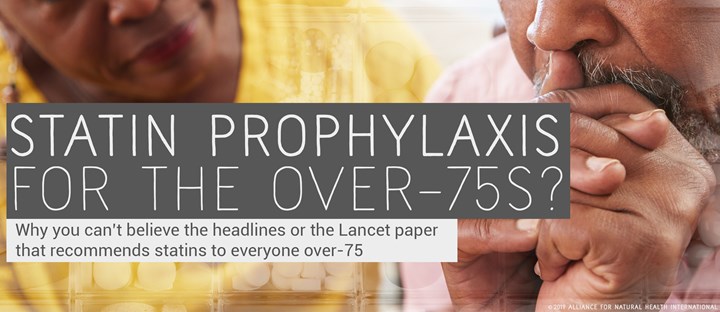By Rob Verkerk PhD, founder, scientific & executive director
Rollback to a rock concert in July 2011, the Superjam in the Albert Hall, London. It was a never-to-be-forgotten fundraiser featuring bands like Deep Purple and was hosted by Jacky Paice, wife of Deep Purple drummer Ian Paice, and head of the charity The Sunflower Jam.
I’ll never forget the interplay between two of the greatest keyboardists the rock world has seen, Jon Lord and Rick Wakeman. It was a privilege to be asked just before the auction to say a few words to the assembled thousands about the need for a revolution in medicine that would see much greater adoption of healthcare methods that were more compatible with humans, their natural environment and our evolutionary background.
What none of us knew on that wonderful evening was that Jon Lord was suffering pancreatic cancer. A month later he was diagnosed with late-stage pancreatic cancer. While Jon was given just months to live, he managed a full 12 months. During that year, Jon had a remarkable journey, not solely in terms of the variety of approaches he used in an effort to manage the cancer. It was 4 months after the diagnosis I remember Jon describing to me this time as the most creative and enlightening period of his life.

John Lord
Following his passing, his wife Vicky, twin sister of Jacky Paice, set up the Jon Lord Fellowship in Jon’s name.
Today, we announce the first fruits of the fellowship, the publication of a very comprehensive review of the most common form of pancreatic cancer, pancreatic ductal adenocarcinoma or PDAC. The review article has been published in the peer-review journal Integrative Molecular Medicine and views the fifth most common cancer, and the cancer with the lowest survival rate, through a genetic and epigenetic lens.
The open access review article, published in Integrative Molecular Medicine.
Despite shifts in the way surgical techniques, chemotherapy and radiotherapy have been deployed over recent decades, survival rates have been almost static for the last 40 years, with no more than 1 patient in every 100 surviving more than 10 years.
The review also evaluates emerging treatment approaches. Most importantly, it proposes that knowledge of an individual’s genetics can be used to inform a personalised approach to pancreatic cancer treatment including natural modalities that could substantially improve outcomes, especially among those where cancer is detected at an earlier stage.
It has been a great privilege to help steer this project over the last two years.
We sincerely hope that the work, carried out in Jon Lord’s name, contributes, one way or another, to a positive shift in the clinical management of pancreatic cancer, as well as to its improved prevention.









Comments
your voice counts
23 November 2017 at 8:16 pm
Hi Rob
The coming issue of Caduceus, 97, going to press next week, is focused on non-toxic cancer treatments, including an article on hyperthermia therapy (and the Metabolic Theory of cancer and the ketogenic diet). The HT article, by the most experienced (German) doctor in the country (in a private clinic), shows the significant improvements using it with chemo or radiation (allowing a reduction in doses of either), including with pancreatic, as shown by this new study (Fan YF, Qin Y, Li DG, Kerr D. Retrospective clinical study of advanced pancreatic cancer treated with chemotherapy and abdominal hyperthermia. J Glob Oncol. 2017 Jul 25. doi:10.1200/JGO.2017.009985 [Epub ahead of print]), which I think you omitted. Despite being used in Germany, the US, Holland and other countries, the only unit at the Hammersmith, London, was closed down over 10 years ago, despite the oncologist in charge at the time saying there should be a unit in every cancer clinic in the country!! Perhaps you could persuade the Strawberry Jam to fund its re-opening or a new unit elsewhere - which would significantly improve the lamentable 5-10-year outcomes in the UK in pancreatic and others cancers.
Simon Best
Editor, Caduceus magazine
www.caduceus.info
23 November 2017 at 8:35 pm
In mid 1980s. Dr Robert Good in USA developed the natural enzymatic cure for pancreatic cancer. He was the world leader in immunology with the 1st bone marrow transplant. He had over 2000 medical papers published. He was REFUSED publication by ALL medical journals.The publishers claimed his ideas were not in line with the concepts of that time. No cancer cure is published in US. That makes it illegal for any doctor to cure cancer. Exactly 77 Holistic Doctors in US working with a new cure,GcMAF have been MURDERED. https://www.sott.net/article/367478-77th-holistic-doctor-and-her-family-shot-dead-in-their-home.
In the UK the 1939 Cancer Act PROHIBITS the publication of ANY cancer cure. It also PROHIBITS any discussion on cancer cures among non medical persons.
Why so? Cancer is a worldwide 1/3 billion$ annual Industry so Cancer Inc. must run a tight ship!
When Dr H R Clark, PhD ND 1st tried to publish her final 600 page work in USA,, (The Cure and Prevention of All Cancers, based on over1/2million precise bio-resonance tests),, she was prosecuted for fraud. She went on to win her case on ' freedom of speech'. She legally published privately. Recently she had her car's brake lines cut,, crashed, survived the crash but only lived a few more years..
Maybe Dr Verkerk can look at this, if it doesn't contravene the UK Cancer Act!!
Your voice counts
We welcome your comments and are very interested in your point of view, but we ask that you keep them relevant to the article, that they be civil and without commercial links. All comments are moderated prior to being published. We reserve the right to edit or not publish comments that we consider abusive or offensive.
There is extra content here from a third party provider. You will be unable to see this content unless you agree to allow Content Cookies. Cookie Preferences